
Left, Dana Evan Kaplan is the rabbi of Shaare Shalom Synagogue in Kingston, Jamaica, and teaches Judaism at the United Theological College of the University of the West Indies. Kaplan is pictured here at the University of Technology Interfaith Fair with Carl Estick, who has been a member of the synagogue for many years. Photo courtesy of Dana Evan Kaplan
KINGSTON, Jamaica (RNS) Since becoming the first ordained rabbi in Jamaica in more than three decades, I have been trying to develop a plan to build a Jewish future in Kingston and throughout the country.
We are a tiny community in a country of 2.8 million.
Spanish and Portuguese Jews began to arrive in Jamaica more than 350 years ago, lured by the prospect of better economic opportunities. Some came directly to Port Royal and others first went to Curacao and/or other islands and then Jamaica. From Port Royal, they moved to Spanish Town, Kingston and elsewhere in the country.
Sometime in the 19th century they blossomed into a community of between 2,500 and 3,000 Jews; about 150 remain.
This estimate may also include a number of Jamaican Jews who emigrated decades ago but maintain their membership to support our now small congregation, as well as a handful of foreigners residing in the country for a short time.
It does not include the many Jamaicans who, though not Jewish by birth, are interested in Judaism, some intensely.
I have never before been in a country where so many people express an admiration for Jews and Judaism and want to draw closer to Jewish spiritual wisdom. We are truly fortunate that there is so much interest in our religion.
Part of the reason is because Jamaicans are such a religious people. They say there are more churches per capita here than anywhere else in the world. And it is also due to the fact that there is so much Jewish history here.
Some skeptics suggest that the interested parties simply want to be affiliated with our successful and tight-knit community. While no one can prove that self-interest isn’t the real motive for some, the Jamaicans I know appear to be incredibly idealistic and sincere.
It is my opinion that we should integrate some of these “outsiders” into our religious community to grow and develop.
But while many on the outside are enamored with our practices, quite a few on the inside are not nearly as passionate.
This is probably because our current practices lack consistency and intellectual rigor. We have simply been doing whatever felt right, and that is by no means the basis for a successful Judaic culture.
We are in need of more engaging practices, of a truly distinctive Jamaican Judaism.
If we are to move forward, we must decide that Jamaican Judaism is worth the effort. It is essential that we learn Hebrew — a language few on the island can read — and begin to develop a set of ritual expectations that follow a uniquely Jamaican way of life.
Along these lines, I have hopes of writing down a set of practices that reflect Jamaican Jewish ritual, of crafting prayers that resonate with the sounds of Jamaica, and songs that are authentically Jewish and Jamaican. This project will take some time, and our success will depend entirely on our congregation’s ability to work together toward this common goal.
Easier said than done.
Like other Jamaicans, we suffer from certain flaws of character that can cripple such a detailed and delicate process, including the tendency to get into heated confrontations rather than working by consensus.
But if we can overcome our differences and find a common ground, we can build a vibrant, growing multiracial community that could become the model for Jewish renaissance around the world.
(Dana Evan Kaplan is the rabbi of Shaare Shalom Synagogue in Kingston, Jamaica, and teaches Judaism at the United Theological College of the University of the West Indies. A widely published author, he holds a Ph.D. in American Jewish history from Tel Aviv University and received rabbinic ordination from Hebrew Union College-Jewish Institute of Religion in Jerusalem. His latest book is The New Reform Judaism: Challenges and Reflections.)
YS/MG END KAPLAN





